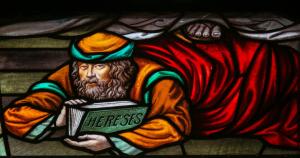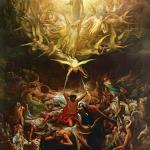In the previous post, I discussed the first, great Christian heresy, the heresy of Judaizing. This theological error, made by many in the earliest days of the Christian faith, places the burden of the Mosaic law back onto the believer in God. It rejects the efficacy of Christ’s atonement on the cross for the sake of sinners, and seeks to reestablish a system of “works-righteousness,” or salvation through or by the Law. The form this heresy takes, or the names it goes under, may change over time and with culture, but the essence is the same: out of pride man demands that he and he alone make atonement for sin. The Judaizing tendency is one of rejecting grace on account of pride in one’s own moral righteousness. The second great heresy, Marcionism, is the opposite of this: it says that the Mosaic Law, and the God that instituted it, were never valid to begin with.
Heresy #2: Marcion’s Antinomianism and The Total Rejection of the Law
The Marcionite heresy is the antithesis of the Judaizing heresy. Marcion was an early 2nd-century Bishop of the Church in Sinope in Anatolia. His story is well known, so I need not rehearse it here. I will get right to the heart of his heretical thought and teaching. The crux of Marcion’s teachings are summed up in four massive claims: first, the God of the Old Testament is not the one, true God. Yahweh is a lesser deity, like Plato’s demiurge, who creates the material world. Second, it follows from this that the Law given by this god is not a valid one, meaning, the Mosaic Law, and really the entire revelation to Israel, are all products of a false god. Finally, since this god is not God, and since its laws are not valid, the entire Old Testament needs to be abandoned. It is not revelation.
The fourth and final claim that follows from these is that Jesus is not one with “the Father,” i.e., the God of the Old Testament. Jesus is a man, a special man to be sure, who instead of pointing to the god of the Bible and rather than fulfilling the sum of that God’s Law, points to an entirely different God, a hitherto unknown and esoteric God; a God who has not yet been revealed in space or time. It is Jesus who first begins to reveal this hidden god to us. Jesus is, in this sense, the first to have genuine knowledge of the one, true God (again, not of Yahweh, who is clearly a lesser god). As such, Jesus is the first “Gnostic” or “person with special knowledge” of the divine.
In his seminal work on the biblical canon, The Biblical Canon, Lee Martin McDonald sums up Marcion’s intentions:
Marcion’s primary aim was separating the Christian tradition from the influence of Judaism, and therefore he selected writings that reflected his goal: Luke and Paul (325).
Marcion acknowledged that the Jewish Scriptures accurately told the story of the creation of the world, but he taught that a god (or Demiurge) who was both vengeful and evil created the world. He also taught that it would be necessary for his followers to read the Jewish Scriptures so they would know their incompatibility with Christian teachings (325).
He [Marcion] rejected all the Jewish influences on the early Christian proclamation (326).
Marcion believed that the Christian gospel was absolute love and contrary to the legalistic and oppressive law of the Jewish Scriptures that was taught by the early church’s leaders in Jerusalem, especially Peter and James (326).
This rejection of the OT as a holy book supported Marcion’s belief that Christianity was something completely new. He stressed that the God of the law was a Demiurge, a creator-god similar to the one found in Gnosticism. He argued that the God of the OT was not the same as the unknown God of the gospel and of Jesus; therefore, he turned his efforts toward a total separation of Christianity from its Jewish roots and influences (326-327)
For Marcion, Jesus did not come to save us from sin, death and the devil. Jesus came to save us from Yahweh and His immoral and unjust Law. This is the literal opposite of the Judaizing heresy. In fact, Marcion held that Jesus’ disciples mistakenly did just this: they “Judaized” the true Gospel, which, of course, Marcion saw himself as restoring. Marcion was, in this sense, also the first Christian “Restorationist” (not unlike Mohammad or Joseph Smith later).
Naturally what follows with regard to “Christian” morality, if Marcion is right, is what the early church called “antinomianism” or the total rejection of the moral law. So, again, while the Judaizers sought to place mankind back under the Law, both its ceremonial and moral burdens, Marcion and his followers argued that the Law was never lawful to begin with, both in its ceremonial and moral demands.
Early Church Father’s Response To Marcion
The early Church responded quickly to Marcion’s rather obvious heresy. The Christian apologist, Justin Martyr, was first to shed light on Marcion’s grave evil:
And there is Marcion, a man of Pontus, who is even at this day alive, and teaching his disciples to believe in some other god greater than the Creator. And he, by the aid of the devils, has caused many of every nation to speak blasphemies, and to deny that God is the maker of this universe, and to assert that some other being, greater than He, has done greater works.
Justin Martyr, First Apology, XXVI
Another early, orthodox Apologist, one Rhodon, calls Marcion the “Pontic Wolf” (Marcion was born in Pontus) a biblical image that applies just as easily to many contemporary Marcionites as it did to the original heretic. After all, unlike their Judaizing counterparts, the Marcionite message is much more accommodating to the natural inclinations of men, to their “concupiscent” nature, than that of the legalists.
One of the most comprehensive critiques of Marcion was conducted by Tertullian, who wrote 5 treatises against the Marcionite heresy. Here is one excerpt from that critique:
Marcion’s special and principal work is the separation of the law and the gospel; and his disciples will not deny that in this point they have their very best pretext for initiating and confirming themselves in heresy. These are Marcion’s Antitheses, or contradictory positions, which aim at distinguishing the gospel from the law in order that from the diversity of the two documents that contain them, they may contend for a diversity of gods also. Since, therefore, it is this very contrast between the law and the gospel that has suggested [to the Marcionites] that the God of the gospel is different from the God of the law, it is clear that, before the said separation…that God [of the Christians] could not have been known who became known from the argument of the separation itself.
Marc. 1.9, in ANF
What follows is Tertullian’s most trenchant criticism of Marcion, namely, that Christ actually came before this separation, and, if that be the case, then whatever “god” Marcion is talking about is not the God that Christ revealed but one of Marcion’s own imagination:
He [God] could not have been revealed by Christ, who came before the separation [of Old and New Testament], but must have been devised by Marcion, who is the author of the breach of peace between the gospel and the law.
Marc. 1.9. in ANF, emphasis added
In sum, the god that Marcion spoke of would have been as foreign to Jesus as it was to the non-Marcionite Christians, especially the Jewish Christians. It is hard to believe that Jesus, who, as far as we know, quoted exclusively the Old Testament to ground both his identity and his teaching, could have been anything but a Jewish rabbi. We might rightly, therefore, call Marcion the first “anti-semite,” not in the sense of ethnic anti-semitism but in the sense of ethical anti-semitism.

Marcianity Today
Today’s Marcionite heresy can be found, for the most part, in what orthodox Christians call “progressive Christianity.” Progressive Christians may not be as open and explicit as Marcion about what they want to do (kudos to Marcion for at least being honest), but their end goals are roughly the same. Progressive Christianity tends to make the same four moves as the Marcionities:
- First, they look to “unhitch” the New Testament from the Old Testament. The Old Testament is, after all, old!
- They treat Jesus as a new God, one who is more knowledgeable, more loving, more genuine than the God of the old testament. In doing so they take Jesus not only out of the context of the Bible, but also out of his 1st-century Jewish context.
- They slowly move believers away from the moral law, treating sin not as an offense against a holy and righteous God, but as a failure to “realize one’s true self.” Of course, once the idea of an objective moral law is suppressed, the “true self” can itself become the standard for one’s behavior.
- Finally, neo-Marcionites segregate parts of the New Testament from other parts, creating a “canon within a canon.” The most obvious attempt at this is done by pitting Paul against Jesus, or Paul’s epistles against the Gospels. An additional step is dismissing some sayings of Jesus, calling them historically inauthentic, while retaining others.
In the end, all heretics have one major problem in common: the totality of the Bible. That is why both the Ebionites and the Marcionites (and their historical successors) both had to drastically reduce the canon of Scripture. For the Judaizers, those Scriptures that made Jesus too Christ-like, or divine, had to be excised from the canon; for the Marcionites, those that made the Christ too human (which eventually lead to Docetism). The Ebionite Jesus is all man, while the Marcionite Jesus all mystic.
Richard Niebuhr, Reinhold’s brother, summed up Progressive Christianity best when he said liberal theology [Christianty] proclaims that:
A God without wrath brought men without sin into a kingdom without judgment through the ministrations of a Christ without a cross.
The atheist, postmodern philosopher, Richard Rorty, who happened to be the grandson of a rather famous liberal theologian, Walter Rauschenbusch, went even further in his articulation of progressive Christianity/liberal theology. In what seems to be a quote from Rorty toward the end of his life, the heir of Rauschenbusch said this:
I’m delighted that liberal theologians do their best to do what Pio Nono said shouldn’t be done – try to accommodate Christianity to modern science, modern culture, and democratic society. If I were a fundamentalist Christian, I’d be appalled by the wishy-washiness of [the liberal] version of the Christian faith. But since I am a non-believer who is frightened of the barbarity of many fundamentalist Christians (e.g. their homophobia), I welcome theological liberalism. Maybe liberal theologians will eventually produce a version of Christianity so wishy-washy that nobody will be interested in being a Christian anymore. If so, something will have been lost, but probably more will have been gained.
Rorty, interview with Modern Reformation
The easiest way for today’s Marcionite to divest a culture of interest in Christianity is just to do what Marcion did then; preach a Gospel detached from the Old Testament, and a Jesus utterly foreign to His Father: an “orphan” Jesus.
C.S. Lewis in his Letters to Malcolm, put his finger on the pulse of liberal Christianity in his own day:
Liberal Christianity can only supply an ineffectual echo to the massive chorus of agreed and admitted unbelief. Don’t be deceived by the fact that this echo so often “hits the headlines.” That is because attacks on Christian doctrine which would pass unnoticed if they were launched (as they are daily launched) by anyone else, become News when the attacker is a clergyman; just as a very commonplace protest against make-up would be News if it came from a film star.
By the way, did you ever meet, or hear of, anyone who was converted from scepticism to a “liberal” or “demythologised” Christianity? I think that when unbelievers come in at all, they come in a good deal further.
Like Judaizing, Marcionism continues to manifest itself through the Church’s history up to today. Again, the names and the forms may changes, but the essence of heresies always remain the same. Marcion didn’t want to conform his life to the moral Law of God. This is still pride, even if in the opposite direction of the Judaizers, who wanted to fulfill the law in their own power. For the Judaizers, God couldn’t be that loving that He would fulfill the Law’s requirements on our behalf. For Marcion, and today’s Marcionites, God really isn’t all that good and, as such, Jesus really had nothing to die for. To quote one modern-day Marcionite, Jesus did not come to save us from sin, he came to liberate us from oppression–as if the two things were different.














